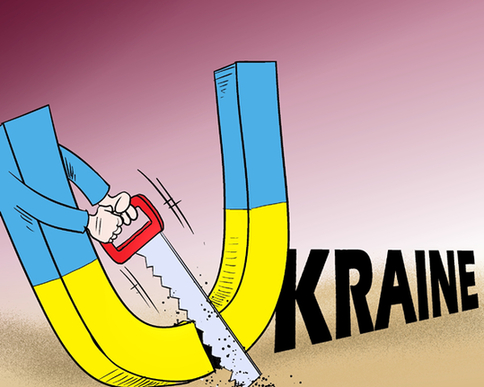Power and politics in Ukraine
- By Heiko Khoo
 0 Comment(s)
0 Comment(s) Print
Print E-mail China.org.cn, February 27, 2014
E-mail China.org.cn, February 27, 2014
The downfall of Ukraine's President, Viktor Yanukovich, is the climax of the three-month occupation of Independence Square in Kiev - dubbed "European square" by protestors. Yanukovich fled, after police, using deadly force. He tried and failed to forcibly evict protestors. The clashes last week cost 88 lives. The forces of the state disintegrated in the face of well-organised and armed resistance by paramilitary opposition groups, predominantly from the so-called "Right Sector".
|
|
|
The secession [By Jiao Haiyang/China.org.cn] |
In the last few days, many politicians from Yanukovich's Regions Party simply defected to the opposition, no doubt to save their hides and protect their wealth and power. The new interim president, Oleksandr Turchynov, declared his pro-European allegiance after members of parliament appointed him to take the reins. German, Polish and French foreign ministers brokered a deal with the opposition, recognizing the overthrow of Yanukovich and empowering the Ukrainian parliament to reorganize politics and power. New elections are to be held on May 25.
What now appears to be a clash over identity: with Western Ukrainians advocating a "return to Europe," and Eastern Ukrainians emphasizing their ties to Russia, is the ideological expression of 23 years of failed economic, political and social policies, which prevented Ukraine emerging as a viable nation state. After being thrust into existence by the collapse of the Soviet Union in 1991, the country experienced a precipitous economic decline. Ukrainian politics became a puppet theatre with the strings pulled by billionaire oligarchs.
Ukraine, once the breadbasket of the former USSR, is a nation rich in resources, skilled labour and ingenuity. However, its free market pioneers grew wealthy through mafia activity. In the late 1980s, the Ukrainian Communist Party (KPU) began to split. The process began with the defection of leaders of the Communist Youth, like Yulia Tymoshenko and Oleksandr Turchynov. After 1991, various splits from the KPU went on to form the main parties of Ukrainian capitalism, which captured power though the criminal appropriation of wealth. Entrepreneurs revealed their business acumen by the contract killing of competitors. The shady figures who took control of the Ukraine used national identity as a smokescreen to disguise the internal capture of state and economic power.
Meanwhile the people languished in dire poverty: according to an OCED report in 2011, 35 percent live on less than US$1 a day. As a consequence there is a widespread nostalgia for the life, economic security and social system of the 1980s. About 62 percent of Ukrainians feel life was better in the Soviet era. Since 1991, production has fallen and investment remained at a standstill. The old industrial economy was bled dry by hyenas feeding on its carcass. The capital acquired in this way was laundered through overseas investments, much of it stashed away in European tax havens.







Go to Forum >>0 Comment(s)